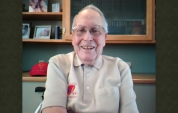4:48 | David Greene recalls hearing about the atomic bombs while aboard ship somewhere between Hawaii and Japan. When he was departing for home after his turn at occupation duty, he was asked if he wanted to pick something from a big pile of Japanese rifles.
Keywords : David Greene Japan atomic bomb rifle souvenir

There were four boys and no girls in the family, so David Greene was experienced with laundry and cooking before he was drafted in 1943. He picked the Marines when given the choice because of a rather odd reason.
There were some guys who grew quite a bit while they were in the Marines. David Greene was stuck at 5', 6" and was always on the end of the left side of the formations. He was tall enough to ship out for the Pacific, though, as a radioman.
There was a table size mock up of Iwo Jima onboard ship. David Green saw it, so the geography of the place was no surprise. As the Marines worked their way up the island, the aim was to keep the line solid from shore to shore. He remembers strafing runs on the enemy and the opportunistic naval bombardment from ships that stayed through the battle.
They figured no more than a week for Iwo Jima, but it didn't go that way. Radioman David Greene explains why it was important to take the island and why the radio wasn't really used once the Marines were ashore.
David Greene tells the story of the time he was nearly buried by a Japanese artillery shell on Iwo Jima. His services as a radioman were not needed once ashore and this led to him being maybe the only Marine who never fired a shot on the island.
David Greene describes dodging mortar fire by running into a mine field on Iwo Jima. Some mines had a larger bomb buried beneath them to target tanks, which were equipped with large flamethrowers.
The Japanese awoke one day to the sight of 850 ships off shore at Iwo Jima. The naval bombardment was not enough, though. Marine radioman David Greene remembers eating his ration one day sitting next to a 16" solid projectile that had skidded to a stop on the beach. He never saw the kamikazes that plagued the ships, but he did see and hear the Japanese version of the Buzz Bomb.
He was in headquarters company, so Marine radioman David Greene was the first to return to a ship after the battle was over. After getting cleaned up and getting a new uniform, he was happy to be back on board after the long ordeal. He enjoyed being aboard ship, as long as you didn't get the bottom bunk.
It was after the war had ended that David Greene was called on to try and signal a large cargo ship with semaphore. There was a typhoon warning and the sailors were frantically signaling. Unfortunately, he was a Marine radioman and his semaphore skills were a bit lacking.
He was drafted for the war plus six months and, when it was all over, David Greene had real low points so he had to stick it out. Once home, he couldn't sleep. The bed was too soft.
He was the "scribe" of the outfit. When he returned from the war in the Pacific, David Greene had a list of names and addresses and he organized a reunion and it grew from there. Others in the group took on the job each time so that reunions were held all over the country.